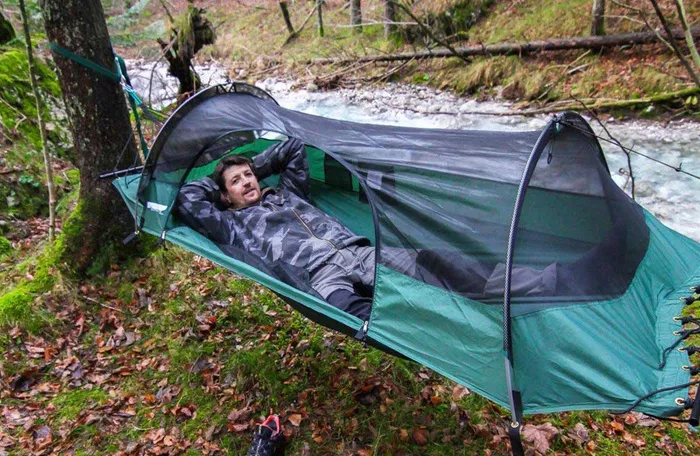Camping hammocks are a great way to relax outdoors. But hanging them the wrong way can harm trees and get you in trouble. This guide will teach you how to set up a hammock legally and safely.
Why Hanging a Hammock Legally Matters
Many campers don’t know that improper hammock use can damage trees. Some parks even ban hammocks because of this. Following the rules protects nature and keeps hammocking allowed in more places.
Tree Damage from Bad Hammocking
Thin straps or ropes can cut into tree bark. This hurts the tree’s ability to grow. Over time, damaged trees may die. Dead trees are dangerous in campgrounds.
Park Rules on Hammocks
Many national and state parks have hammock rules. Some require special straps. Others ban hammocks completely. Always check local rules before hanging.
Choosing the Right Location
Picking a good spot is key for legal hammocking.
Find Strong, Healthy Trees
Look for trees that are:
- At least 6 inches thick
- Alive (no dead branches or peeling bark)
- Growing straight
Check the Distance
Ideal trees are 10-15 feet apart. This gives proper sag for comfort.
Avoid Protected Areas
Don’t hang hammocks in:
- Wilderness zones
- Historic sites
- Areas with rare plants
Essential Hammock Gear
Using the right equipment protects trees and keeps you safe.
Tree Straps
Wide straps (at least 1 inch) spread weight evenly. They prevent bark damage. Never use ropes or thin cords.
Carabiners
Strong metal carabiners connect straps to hammock. Plastic ones can break.
Suspension System
A good system includes:
- Adjustable straps
- Reliable hardware
- Easy setup
Step-by-Step Hanging Guide
Follow these steps for a safe, legal hang.
Check Local Rules
Search online or ask rangers about:
- Hammock bans
- Special requirements
- Protected areas
Find Good Trees
Pick two healthy trees the right distance apart. Avoid trees with nests or animal homes.
Set Up Straps
Wrap straps around trees:
- At least 4 feet off the ground
- Over live branches, not under
- Flat against the bark
Attach Hammock
Connect hammock ends to straps:
- Use carabiners
- Keep angle about 30 degrees
- Sit to test before full weight
Special Situations
Sometimes you need extra care when hanging.
No Trees Available
In areas without trees:
- Use hammock stands
- Find rock anchors (where allowed)
- Consider going to a different site
Camping in Bear Country
In bear areas:
- Don’t hang near food
- Keep hammock at safe height
- Use bear-proof containers
Leaving No Trace
Good campers protect nature. Follow these tips:
After Hanging
Check straps daily for:
- Tree damage
- Proper position
- Wear and tear
When Leaving
Remove all gear completely. Look for:
- Left behind straps
- Bark impressions
- Any trash
Troubleshooting Common Problems
Even experts face issues sometimes.
Hammock Too Loose
If you’re touching ground:
- Move straps higher on trees
- Shorten the distance between trees
- Adjust suspension tighter
Trees Too Far Apart
For wide spaces:
- Use longer straps
- Find closer trees
- Consider a hammock with spreader bars
Advanced Tips for Comfort
Make your hammock even better with these tricks.
Perfect Angle
Aim for about 30 degrees on suspension. This gives the flattest lay.
Sleeping Position
Lie diagonally in the hammock. This is more comfortable than straight.
Weather Protection
For rain or sun:
- Add a tarp overhead
- Use a hammock with built-in cover
- Face openings away from wind
Hammock Safety Tips
Stay safe while enjoying your hang.
Weight Limits
Check your hammock’s max weight. Include yourself plus gear.
Night Safety
After dark:
- Use a light to find your hammock
- Keep essentials close
- Check straps one last time
Wildlife Awareness
Watch for:
- Bees nests above
- Ant trails below
- Animal paths nearby
Teaching Others
Help spread good hammocking practices.
Show Proper Technique
Demonstrate how to:
- Wrap straps correctly
- Test the hang
- Adjust for comfort
Explain Why It Matters
Tell new campers about:
- Tree protection
- Park rules
- Long-term access
Frequently Asked Questions
Are hammocks allowed in all parks?
No. Rules vary by location. Always check before your trip.
Can I hang a hammock from one tree?
Only with special stands. Two solid anchors are safest.
How high should a hammock be?
About 18 inches off the ground when empty. This prevents hard falls.
Conclusion
Legal hammocking protects trees and keeps parks open for everyone. With the right gear and knowledge, you can enjoy nature responsibly. Always follow local rules and leave no trace. Happy hanging!
Remember: Good campers protect the outdoors they love. Your careful hammock setup helps ensure future generations can enjoy camping too.
Related topics:
Best Lightweight Camping Hammocks: A Complete Guide
Best Lightweight Hammock for Outdoor Adventures

